Part 1 of the India’s ‘Soft’ Enemies series
By Sandhya Ravishankar
Since 2016, the Modi government has embarked on a relentless crackdown on foreign funded NGOs and other organisations.
FCRA (Foreign Contribution (Regulation) Act, 2010) licences of 6677 NGOs stand cancelled between 2017 and 2021, as per a statement by the Union Minister of State for Home Nityanand Rai in the Lok Sabha last year. Between 2011 and 2019, registrations of over 19,000 voluntary organisations has been cancelled by the Union Home Ministry.
But The Lede has found that George Soros’ Open Society Foundation, Pierre Omidyar’s Omidyar Network as well as The Ford Foundation founded by Henry Ford’s son, continue to route funds into India circumventing the FCRA laws.
The three foundations have been put on a prior watchlist by the Centre – meaning that they can only donate if the Indian government scrutinises their funding and green signals the same.
Due to these severe restrictions, the foundations have now adopted a new strategy. They build and fund layers upon layers of organisations, through which their money is routed.
Which begs the question – why are foreign foundations so desperate to keep investing in Indian NGOs and other organisations? Why are these foundations willing to break the law of the land just to send money to NGOs and other organisations?
The Lede analysed a large number of NGOs who are funded either directly or indirectly by these foundations and found a number of interesting connections. In effect, the foundations are linked to two ultimate goals:
- To support activities that are against the Indian government.
- To sponsor and fund media publications that write against the Indian government.
But first, for the uninitiated, let us quickly introduce the foundations.
The Big Three
Open Society Foundation: This is billionaire hedge fund investor George Soros’ “political philanthropy project”, by his own admission. The foundation’s stated aim is to “work to build vibrant and inclusive democracies whose governments are accountable to their people.” The foundation is run by 92-year-old George Soros and his son Alexander Soros.
The Ford Foundation: This foundation was founded by Edsel Ford, son of famous car-maker Henry Ford in 1936. Their vision is one “of social justice—a world in which all individuals, communities, and peoples work toward the protection and full expression of their human rights; are active participants in the decisions that affect them; share equitably in the knowledge, wealth, and resources of society; and are free to achieve their full potential.” This foundation is run by a 16-member board led by president Darren Walker.
Omidyar Network: This is a foundation founded by Pierre Omidyar, who is a French born Iranian-American billionaire founder of eBay. His wife Pamela Omidyar also runs the foundation jointly with him. The network calls itself a “social change venture that reimagines critical systems, and the ideas that govern them, to build more inclusive and equitable societies—for the benefit of the many, not just the few—across the globe.”
These three foundations intersect in their goals and in their methods of functioning, as we shall see later on in this piece.
Modus Operandi To Impose Policy, Effect Regime Change
Catch ‘Em Young & Embed
All three foundations offer fellowships and scholarships for students in India wanting to study abroad. These students are meticulously handpicked and eventually, they form part of a network of organisations, advocacy groups and NGOs that are lavishly funded by the three foundations.
Sound familiar? It is akin to indoctrination. In line with the stated goals of the foundations, these students are also echo chambers that continually drive narratives against countries which are viewed as “totalitarian” or “autocratic” by those who run these foundations.
A glaring instance is that of George Soros’ recent speech at the Munich Security Conference on February 16. “Adani is accused of stock manipulation and his stock collapsed like a house of cards. Modi is silent on the subject, but he will have to answer questions from foreign investors and in parliament. This will significantly weaken Modi’s stranglehold on India’s federal government and open the door to push for much-needed institutional reforms. I may be naive, but I expect a democratic revival in India.”
It was an unexpected speech but one that sent the Indian government into punch throwing mode with the External Affairs Minister S Jaishankar referring to Soros as an “old, rich, opinionated and dangerous billionaire”. The Minister for Women and Child Development, Smriti Irani, termed Soros’ speech an “attack on India.”
The reaction was not surprising, since Soros has, in the past, criticised what he viewed as “totalitarian regimes” in Russia, China, Israel, Hungary and many other countries. He is also widely accused of using his wealth to fund organisations that fuel protests and spread disinformation in order to effect regime change.
The Ford Foundation and Omidyar Network are, however, more careful and do not speak out as Soros does. Their actions across countries, however, mirror and mimic those of the billionaire.
In this context, it is hardly surprising that the students and young professionals who get fellowships from the Open Society and the other foundations, pack specific narrative punches consistently. Here is an example below.
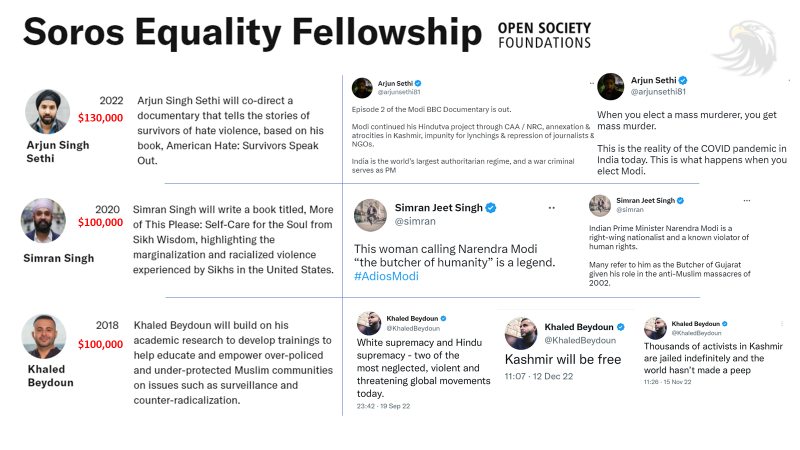
These young men are recipients of the Open Society Fellowships and as is evident, tweet along similar lines. Twitter OSINT user @thehawkeyex has compiled the tweets and points to a trend. This is only an example – more in-depth research into the other fellowship recipients points to the same trend.
These young professionals, as discussed before, become embedded in an ecosystem where the narrative decided by the foundations reign supreme. They are then deployed across the world to “troubled countries” to act as advocates of the foundation’s mission.
Why Should Indians Be Concerned?
The Lede reached out to NGO Monitor, a research institute based in Israel, which fact-checks NGOs and their funders in the context of the Arab-Israeli conflict. The NGO Monitor has had a special consultative status with the UN Economic and Social Council since 2013.
Speaking specifically on Soros’ and Open Society Foundation’s modus operandi, NGO Monitor’s representative (who did not want to be identified for security concerns) said – “He (Soros) has a very clear political philosophical ideology – open society. Humans are most important and borders don’t matter. When policy change happens, people need to rise from the ground and give them the tools to make change. That’s why he funds education and universities – he believes change should come from the grassroots.”
The representative stated that they had found clear evidence of Soros’ interference in the political situation of countries such as Ukraine, Russia, Hungary, Croatia and the Eastern Bloc. “Soros tried the same thing in Arab countries but civil society is not so developed there so his success was limited. For example, the Arab Spring became an Islamic Winter. NGOs played a large role in the Arab Spring – they did things to gain headlines. But when you look closely at the work of Soros-funded organisations, their claim to democracy is hollow. Why didn’t any one of these NGOs push for more women participation in the movement? Why was there no talk about women’s rights? This is because all their work was aimed at grabbing headlines.”
“The next generation will be the bureaucrats and the journalists and the policy makers who will bring about “change” as per Soros’ ideas. That is the reason he funds them from a young age and places them in organisations linked to him. He claims he put money to throw out former US President Donald Trump and funded the Black Lives Matter protests as well,” he said.
Soros, particularly, is credited with the infamous “breaking of the Bank of England” in 1992 when he shorted the British pound, the 1997 Asian Financial Crisis when he shorted the Thai Baht sending Asian economies into freefall, and has expressed little remorse for his actions that resulted in huge human cost. Similarly Hungary and Israel, apart from Russia, have criticised the billionaire and taken steps to prevent him from interfering in their respective countries.
The Foundations In India: Conduits & Conspiracies
In order to shine a light on how these foundations work in India, The Lede focusses on three organisations which have received funding directly from the three foundations over the years.
These are:
- Commonwealth Human Rights Initiative (CHRI)
- National Foundation of India (NFI)
- Centre for Policy Research (CPR)
We will see more about these organisations in Part 2 of the series.
(With additional reporting by Sandhya Sridhar, Abhijit Iyer-Mitra, Twitter OSINT user @thehawkeyex and The Lede’s research team)
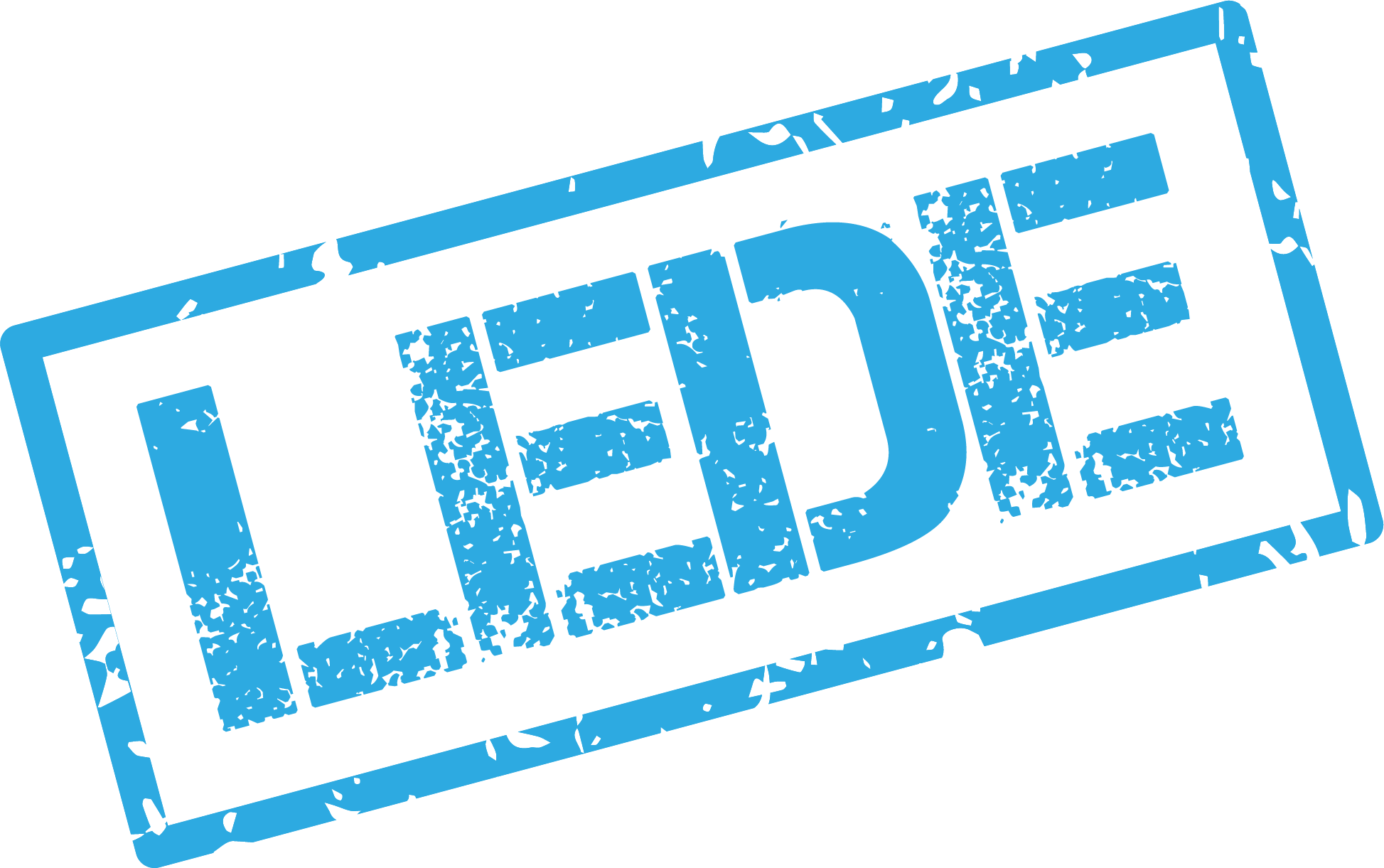

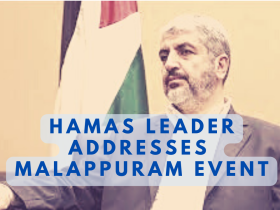
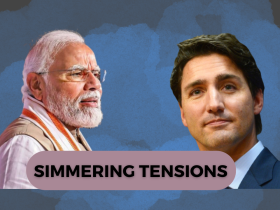
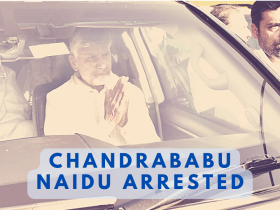
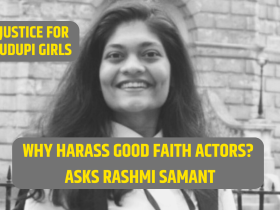
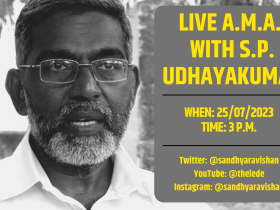
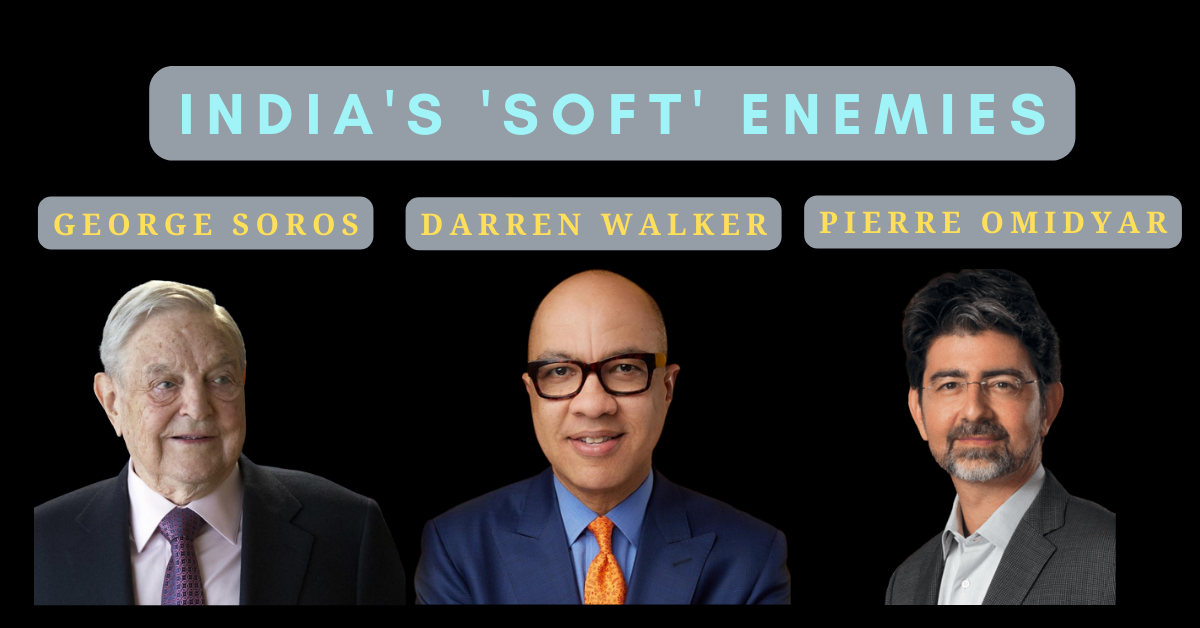


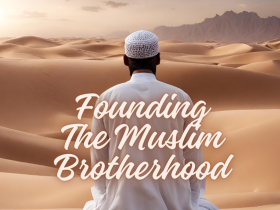

Leave a Reply